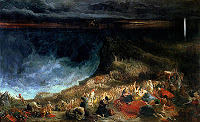John M. Gottman is an American Psychologist renowned worldwide for his extensive research on marriage. He has spent over forty years developing measurements to predict who would become divorced and who would stay married. When I was still a practicing couple’s therapist, I took a seminar with him on assessment of couples who present for marital counseling. One question in evaluating a couple’s potential to overcome difficulties in their relationship was to ask them, “What were the qualities that attracted you to your spouse when you chose one another?” If the couple got all dewy eyed as they recounted their first meetings, the therapist knew that there were still some sparks of love left for the relationship to rebuild upon. If, on the other hand, the couple glared at each other in stony silence, or the couple could not remember anything positive about their relationship, the therapist knew this was going to be a difficult couple to help.
The sages ask the same question about the relationship between Abraham and G-d. Why did G-d choose Abraham? What qualities did Abraham have that made G-d “fall in love with him” as it were? Curiously, last week’s parasha, where G-d tells Abraham He will make him a great nation, is silent on the matter. The Torah tells us why G-d chose Noah out of all the humans on the earth to be saved. Noah was righteous in his generation. But when G-d chooses Abraham, the text does not describe him as righteous, it does not tell us that he “fears G-d”, the text says nothing to praise him.
The Maharal of Prague was perplexed as well by this absence of a reason for choosing Abraham. The Maharal, also known as Rabbi Judah Loew ben Bezalel, was a great scholar who lived in the 16th century. On our congregational trip to Central Europe two years ago, we saw the famous statue of the Maharal of Prague outside of city hall. We also visited his grave in the Old Jewish Cemetery. He concludes that if G-d chose Abraham and his descendants for a specific quality, then if this quality should somehow disappear from the Jewish people in the future, G-d would feel justified in rescinding His choice, and leaving the Jewish people. To prove his point, he quotes Pirke Avot, “All love that depends on a specific quality, when that quality disappears, so does the love. But when love does not depend on a specific quality, when that quality disappears, the love endures.” Since G-d’s love for Abraham and his descendants did not depend on a specific quality, this love would endure even if Abraham’s descendants should sin. A sort of insurance policy in the event we, the Jewish people, should anger G-d. The bond was unbreakable. There could be no divorce!
Recently our Thursday morning study group heard a lecture by Rabbi Meir Soloveitchic, an American Orthodox rabbi who also addresses this issue. He maintains that the key to understanding why G-d chose Abraham is found in this week’s parasha. The passage he refers to comes as G-d is contemplating whether to share with Abraham His decision to destroy Sodom and Gomorrah. The Torah says, “For I love him, for I know he will instruct his children and his household after him to keep My way by doing what is just and right…”
Let’s analyze that verse. First, the verse says that Abraham would teach his children and household “after him”. This means that Abraham did not say one thing and do another. He was a model that his children and grandchildren could look up to. They could and learn by watching his behavior how a Jewish person should act. Abraham observed Shabbat and holidays, said kiddush on Friday night, served on committees in his synagogue, gave money to Jewish causes and engaged in adult education. Secondly, G-d loved Abraham because Abraham would do what is “just and right”. Abraham would do what was “just” by involving himself in issues of social justice. He would not turn a blind eye to prejudice and oppression in the society in which he lived. He was actively engaged in the issues of his time. But he would also do what was “right”. He would educate his children and household in the right way to live a Jewish life. . He sent his children to Hebrew school, enrolled them in a Jewish summer camp, encouraged them to be continue with their Jewish education after their bar and bat mitzvahs. Finally, Abraham would “keep the way of G-d”. Abraham’s Judaism consisted of more than an ethnic identity. It consisted of more than ritual observance, more than speaking Hebrew, more than a love of Israel, more than intellectual knowledge, more than standing up to injustice. Abraham’s life had a spiritual dimension as well.
Each one of us should strive to make ourselves worthy of being chosen by G-d by following Abraham’s example of integrity, responsibility and love of G-d.
[Photo by Markus Spiske on Unsplash]
Shabbat Shalom



